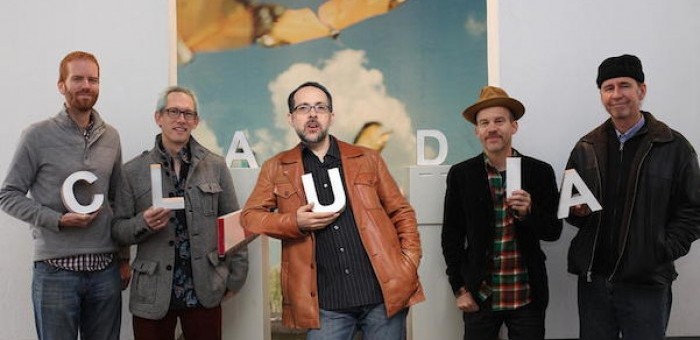Jan 13, 2026 2:09 PM
More Trump-Kennedy Center Cancellations
The fallout from the renaming of the John F. Kennedy Center for the Performing Arts to include President Donald…

Red Wierenga, Matt Moran, John Hollenbeck, Chris Speed and Drew Gress are The Claudia Quintet. The band performed at the Ottawa Jazz Festival June 29.
(Photo: Signe Maehler)Despite the loss of one of its primary venues—due to renovations and street closures ahead of a visit from U.S. President Barack Obama—the 36th edition of the TD Ottawa Jazz Festival drew large crowds to many of its 102 concerts held June 22–July 3.
The tone was set on opening night—advanced one day to accommodate the schedule of saxophonist Kamasi Washington—when an enthusiastic audience turned out to greet the Los Angeles-based saxophonist at the National Arts Centre’s 900-seat theater.
The crowd welcomed the young phenom like a rock star, whooping at the announcement of songs like “Re Run” from his acclaimed triple album, The Epic (Brainfeeder), and cheering his humorous, self-deprecating introductions.
On a tour that included stops at the Coachella, Bonnaroo and Glastonbury festivals, Washington’s octet seemed programmed to create the kind of buzz expected at a rock festival, trading subtlety for crowd-pleasing elements like Brandon Coleman’s energetic keytar solo and bassist Miles Mosley’s over-the-top song “Abraham,” which showcased his use of electronics on his upright instrument.
The presence of two drummers—Tony Austin and Ronald Bruner Jr.—and the inevitable extended drum workout also seemed geared toward a larger venue, but they proved to be a highly effective engine when they locked up behind Washington, his saxophonist father, Rickey, and trombonist Ryan Porter. With Patrice Quinn adding wordless vocals, the unit at times had the multi-directional thrust and rhythmic power of Steve Coleman’s Five Elements.
Quinn also stepped into the spotlight to perform the anthemic “Henrietta Our Hero” and the surging set-closer, “The Rhythm Changes,” as well as adding a visual element with interpretative dance movements throughout the nearly two-hour show.
Washington proved to be a most generous leader, ceding solo space to his bandmates throughout the evening. In the end, this was music of a collective nature, and those fest attendees wanting to take more of a measure of Washington himself will have to wait.
The trio of Polish pianist Marcin Wasilewski—with longstanding bandmates Slawomir Kurkiewicz on bass and Michal Miskiewicz on drums—also presented a tightly designed show that has been well honed for festival audiences. The band’s opening triad—“Spark Of Life” and “Sudovian Dance,” both from Wasilewski’s most-recent ECM release, and “Night Train To You”—met the expectations of listeners familiar with the somewhat austere nature of the band’s recordings.
“Austin,” dedicated to jazz pianist Austin Peralta (1990–2012), took things deeper, with a gorgeous, emotive melody and highly sympathetic backing from Kurkiewicz and Miskiewicz.
Shifting gears, Wasilewski destroyed the stereotype of non-swinging Eastern Europeans by ripping through Herbie Hancock’s boogaloo-based “Actual Proof.” The burning performance, with its insistent central piano vamp, was a festival highlight.
In the same venue—an intimate, jury-rigged space designed to replace the festival’s main indoor room—pianist Myra Melford’s Snowy Egret displayed both rigorous abandon and heart-wrenching pathos. The latter was embodied by trumpeter Ron Miles’ solemn solo on “The Virgin Of Guadalupe,” which contrasted starkly against the exuberant, explosive mood of “The Kitchen” and the endlessly creative playing of drummer Tyshawn Sorey.
Both visually and sonically, the quintet was a study in extremes: from guitarist Liberty Ellman’s linear reserve to bassist Stomu Takeishi’s rumbling attacks. Bridging it all was Melford, moving from full-keyboard assaults to icy, perfectly articulated phrases.
The Claudia Quintet was equally diverse, while treading much different ground. “Peterborough” set the tone, with its precisely placed phrases by vibraphonist Matt Moran and bassist Drew Gress and the shimmering gloss of Red Wierenga’s accordion, while “Nightbreak,” a radical reimagining of a Charlie Parker solo, meshed chamber music and bebop in a way that would only occur to the band’s leader, drummer-composer John Hollenbeck.
If anyone thought Hollenbeck could only bend bop through a European prism, he proved differently on his driving tribute to drummer Philly Joe Jones—an effective showcase for reedist Chris Speed.
On the festival’s main, outdoor stage, large audiences heard an exquisite, if somewhat bloodless, performance by Chick Corea, Christian McBride and Brian Blade, and a typically high-spirited show by the Jazz at Lincoln Center Orchestra with Wynton Marsalis.
Strong pop-music sets by veteran Canadian singers Sarah McLachlan and Buffy Sainte-Marie also proved to be crowd favorites, but both paled to the ardor shown for Brian Wilson’s 50th-anniversary showcase of the Beach Boys’ album Pet Sounds, performed by an extraordinarily tight band that more than compensated for the leader’s vocal limitations.

Belá Fleck during an interview with Fredrika Whitfield on CNN.
Jan 13, 2026 2:09 PM
The fallout from the renaming of the John F. Kennedy Center for the Performing Arts to include President Donald…

Peplowski first came to prominence in legacy swing bands, including the final iteration of the Benny Goodman Orchestra, before beginning a solo career in the late 1980s.
Feb 3, 2026 12:10 AM
Ken Peplowski, a clarinetist and tenor saxophonist who straddled the worlds of traditional and modern jazz, died Feb. 2…

The success of Oregon’s first album, 1971’s Music Of Another Present Era, allowed Towner to establish a solo career.
Jan 19, 2026 5:02 PM
Ralph Towner, a guitarist and composer who blended multiple genres, including jazz — and throughout them all remained…

Rico’s Anti-Microbial Instrument Swab
Jan 19, 2026 2:48 PM
With this year’s NAMM Show right around the corner, we can look forward to plenty of new and innovative instruments…

Richie Beirach was particularly renowned for his approach to chromatic harmony, which he used to improvise reharmonizations of originals and standards.
Jan 27, 2026 11:19 AM
Richie Beirach, a pianist and composer who channeled a knowledge of modern classical music into his jazz practice,…